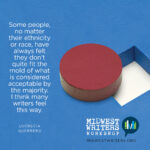Meet Lucrecia Guerrero
 Lucrecia Guerrero’s short stories and nonfiction have appeared in literary journals and have been anthologized, most recently in “Puro Chicanx Writers of the 21st Century,” and “Indomitables / Indomables.” Chasing Shadows, linked short stories, was published by Chronicle Books. Tree of Sighs, a novel, was honored with the Christopher Isherwood Fellowship Award and Premio Aztlan Literary Award. On the Mad River, her recent novel, was published in February 2024. Guerrero is an experienced creative writing teacher and workshop facilitator who enjoys interacting with writers of all levels.
Lucrecia Guerrero’s short stories and nonfiction have appeared in literary journals and have been anthologized, most recently in “Puro Chicanx Writers of the 21st Century,” and “Indomitables / Indomables.” Chasing Shadows, linked short stories, was published by Chronicle Books. Tree of Sighs, a novel, was honored with the Christopher Isherwood Fellowship Award and Premio Aztlan Literary Award. On the Mad River, her recent novel, was published in February 2024. Guerrero is an experienced creative writing teacher and workshop facilitator who enjoys interacting with writers of all levels.
Lucrecia will be teaching “Create Characters that Breathe” and “Settings that Become Character” and participating in the panel, “Diversity/Inclusivity in Literature and Publishing” She is also a member of the Manuscript Evaluation team.
Check out the Full Faculty and the Conference Schedule…
…then visit our Registration Page!
Q&A with Lucrecia
I recently read Lucrecia’s Tree of Sighs and was transported by the crispness of her settings and the deep dive into the introspections and actions of her characters. Her classes on those topics are going to be highly informative and engaging. Get ready!
MWW: I’m always curious about the characters we create, and you’re giving a session on writing characters “that can breathe,” so let me get your take on where our characters come from. Are there parts of ourselves present in all of the characters that we write, from the ones we love the most to the ones we despise?
our characters come from. Are there parts of ourselves present in all of the characters that we write, from the ones we love the most to the ones we despise?
LG: Great question. I think one of the things I love most about writing is creating characters. It’s difficult to really understand the creative process, but short answer to your question: Yes, I do believe that there’s a part of ourselves present in all our characters. After all, the seed for the character forms and grows in the author’s mind, taking shape out of all the memories, images, experiences that are stored inside that miraculous organ. So, in that sense, the author’s imprint is present in each character.
For example, in my novel, On the Mad River, I began by remembering an experience hitchhiking when I was a teen. Inspired by that incident, I began writing. So, Rosa Linda in that story shares an experience similar to mine. But as I continue to write, Rosa Linda develops into her own person with her own personality and experiences. She is not me. In that same novel, Enon fits the description of a “despicable” character. I’ve never done the things he does, but what he feels, thinks, and does comes out of my imagination, conscious and subconscious. As he develops and becomes himself and a fully rounded character, I find that he shares some universal qualities with the rest of humanity.
MWW: In Tree of Sighs, your protagonist struggles with her identity and culture; it’s an important book. In what ways does Grace/Altagracia’s journey of Hispanic/Latino individuals in general?
 LG: For Altagracia, her move from Mexico to the U.S. Midwest is sudden and traumatic. A new identity is imposed upon her: a different name, a different persona, a different foreign language. Plus, she has to deal with the shocking circumstance of how she came to leave her native country.
LG: For Altagracia, her move from Mexico to the U.S. Midwest is sudden and traumatic. A new identity is imposed upon her: a different name, a different persona, a different foreign language. Plus, she has to deal with the shocking circumstance of how she came to leave her native country.
But culture shock can happen to anyone who is transplanted from one culture to another. Even if you research the new setting ahead of time, there will always be those little unspoken differences that can trip you up.
Some readers may have never experienced culture shock, where they must learn to adapt to the culture outside them while still living with the past inside them, but they may have encountered situations where they feel outside the norm, different. For example, in On the Mad River, author W.K. Stratton in his comments calls character Donnie Ray an “Appalachian refugee,” and refers to Donnie Ray and Rosa Linda as “two outcasts in the American heartland. My point: some people, no matter their ethnicity or race, have always felt they don’t quite fit the mold of what is considered acceptable by the majority. I think many writers feel this way.
MWW: You’re giving a session on setting, which is such a crucial element of storytelling—we have to “set” the scene, right? Tell us about one of your favorite settings from a book and what elements made it successful.
LG: Well, first of all, I’ll let the readers decide how “successful” I was in creating the setting. I don’t know if I could pull out one particular scene, especially out of a novel, because it is the accumulation of scenes that really pull the reader into the setting. But I do remember really getting into describing the neighborhood bar in the Appalachian enclave in the city of Mad River in On the Mad River. Of course, I ticked off the senses when describing it, allowing the reader to see, hear, smell, touch, maybe even taste. But also while describing the setting, I found myself focusing on details that not only gave sensory details, but also a sense of closed community, desperation, frustration, violence.
MWW: Who are some authors who have influenced and/or inspired you?
LG: As a student, I always appreciated F. Scott Fitzgerald’s ability to tell so much with well-chosen details. One of my favorite books at university was Edith Wharton’s Ethan Fromme. There, too, I love how the carefully chosen details not only gave a vivid image of the setting but also created an atmosphere that permeated the whole story. I also enjoyed the dialogue of Eudora Welty and Flannery O’Connor. The magical realism of Gabriel Garcia Márquez
I love how the carefully chosen details not only gave a vivid image of the setting but also created an atmosphere that permeated the whole story. I also enjoyed the dialogue of Eudora Welty and Flannery O’Connor. The magical realism of Gabriel Garcia Márquez
More recently, I just finished reading the third book in Elena Ferrante’s (translated from the Italian) series of four Neapolitan novels. I am so inspired by her meticulous details, the amazing sense of place.
From answering this question, I see I’ve always been enamored of character and setting!
|
|




